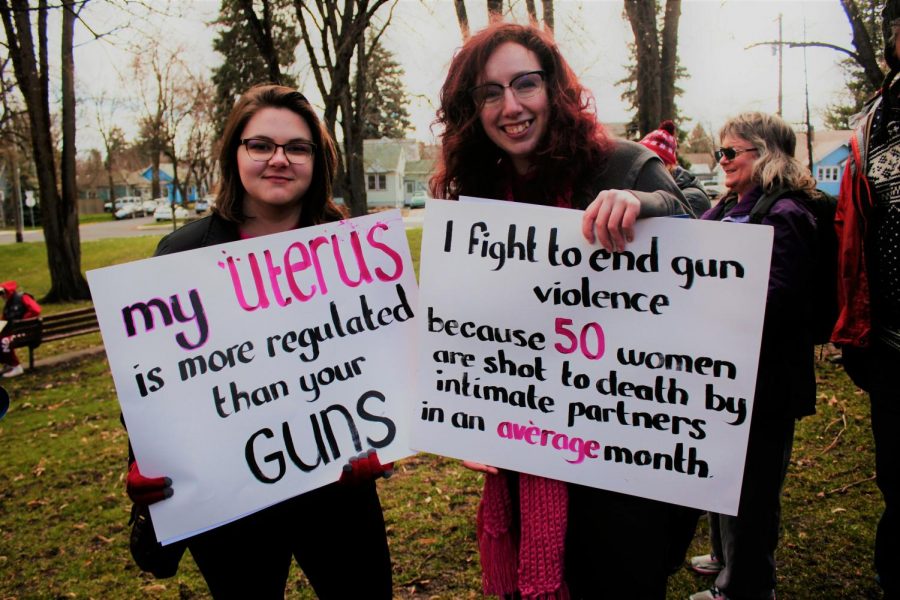Students correct abortion misconceptions
Generation Action president emphasizes benefits of organization, Planned Parenthood health services
Sydney Pederson, right, president of WSU’s Generation Action chapter, participated in the March for Our Lives protest. She explained that no one advocates for abortion. Rather, she said abortion is an intimate choice for the woman to make on her own.
March 29, 2018
For Sydney Pederson, president of WSU organization and Planned Parenthood affiliate Generation Action, supporting Planned Parenthood is not only about protecting reproductive rights, but ensuring healthcare as a right for everyone.
According to Planned Parenthood Action Fund’s website, Generation Action is a network comprised of young leaders and activists throughout the nation who organize events to raise awareness and mobilize other advocates of reproductive freedom.
The organization has been active in the WSU community relatively recently, and while they are a funded branch of Planned Parenthood, they operate independently from the greater organization, Pederson said.
As an organization at WSU, Generation Action hopes to provide reproductive education to students. Upon request, they will visit residence halls to host workshops and provide information on a variety of contraceptives and safe sex practices, Pederson said. Generation Action also tables every Friday in the CUB for what she called “Free Condom Friday.”
Pederson said the community response to Generation Action and Planned Parenthood has been mostly supportive, with some students even providing unsolicited donations. She believes most are just thankful to have access to affordable healthcare within their community.
The few negative responses they do receive, Pederson said, are so minor that volunteering for Generation Action remains an uplifting experience. However, some criticisms have either been in the form of insults or misconceptions.
“We table on Good Friday, and some have interpreted that as a commentary on their religion,” Pederson said. “It’s not a commentary — we are just there on Friday.”
With continued pressure from anti-abortion groups for the federal government to defund Planned Parenthood, Pederson emphasized the variety of services the health center provides.
“They are actively working on becoming a general care provider for more people in the region by 2019,” she said.
According to the services section of their website, Planned Parenthood provides a wide range of medical procedures ranging from in-vitro fertilization and screenings for sexually transmitted diseases, to men’s health services like prostate exams. Pederson said they continue to bolster their health services.
Despite their efforts to improve public perception by refocusing attention on the other services they provide, Planned Parenthood remains controversial.
“They overlook everything we do and focus on the one thing they disagree with,” Pederson said. “[They] want to defund an entire center of a community because of something that isn’t against the law and is a personal choice.”
She said an essential aspect of the service provided by Planned Parenthood is ensuring that each patient is fully aware of all of their options.
“They are never going to tell someone that they should [or shouldn’t] have an abortion because, in the end, it is that person’s decision,” Pederson said. “They are just going to provide all the resources so that person is fully informed.”
Planned Parenthood has set procedures to ensure the decision of whether to have an abortion remains the patient’s. Pederson said that if a patient does request an abortion, neither the patient’s partner nor parents will be permitted within the meeting room. This is to prevent anyone from influencing the patient’s decision.
“Honestly, no one is pro-abortion,” Pederson said. “No one really wants other people to have to have an abortion, but it is something people turned to because they have no other option.”
Among the criticism surrounding Planned Parenthood is the health center’s role as a distributor of the controversial medication Mifeprex, more commonly known as the abortion pill.
Formerly known as RU-486, the pill became controversial due to its link in the early 2000s with the deaths of several women. Since then, the drug has been modified and approved by the FDA. RU-486 was renamed Mifeprex to reflect that it was a different drug from the ones that had caused the bacterial infections leading to these women’s deaths.
Pederson acknowledged the tragedy of these deaths but argued via the CDC and FDA that no causal link between Mifeprex and death has been found. She said there are some potentially harmful side effects, such as internal bleeding, but these are quickly fixed with surgery.
According to the FDA’s website, they now recommend taking a lower dosage and engaging in frequent follow-ups with a healthcare provider.
While Planned Parenthood has yet to be defunded, some state legislatures have passed laws requiring health centers that provide abortions to also supply patients with information on abortion reversals.
Pederson said the concept of abortion reversal has not been verified through peer-reviewed research, referring to a fact sheet published by the American College of Obstetricians and Gynecologists. She warned of the dangers of trusting information that isn’t supported by scientific research.
Due to the controversial nature of Planned Parenthood, the members of Generation Action are faced not only with the occasional rude comment, but also with the genuine threat of violence.
“I have the discussion every year with new volunteers [when we go to protest],” Pederson said. “If someone enters our meeting and starts shooting or making death threats, get yourself out. Because it is important that at least one of us makes it out.”









